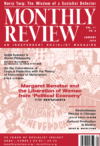Movements

Hilary Rose, a sociologist, and Steven Rose, a neuroscientist, were two of the principal founders of the British Society for Social Responsibility in Science in the late 1960s in London. They speak about their work as scientists and antiwar activists, particularly around the issue of Palestinian liberation. | more…

The main criticism leveled at the socialist economies was that a planned economy was inherently less efficient than a market one, due to the sheer scale of the bureaucratic task involved with planning a major economy. But the collapse of the Soviet and later the Russian economy under Mikhail Gorbachev and then Boris Yeltsin was an economic disaster that was otherwise unprecedented during times of peace. The world’s second superpower was reduced to the status of a minor bankrupt economy with a huge decline in industrial production and in living standards. | more…
A Socialism for the Twenty-First Century?
Starting in the late 1960s, the development of the productive forces of society entered a new stage: the Information Revolution, an era focused on the application of information theories such as cybernetics combined with advances in computer technology and digital communication networks, culminating in the Internet. Under capitalist conditions, this has already resulted in a knowledge economy, but the social, auto-regulatory possibilities it opens up are bound to be incompatible with the private appropriation characteristic of capitalism. | more…

My pop was always working on our house, a shack that was all my parents could afford in the great hunger for homeownership that came after the Second World War. But nothing ever quite got finished, either for lack of funds or motivation. But if he wasn’t quite a craftsman himself, he admired craft. He was moved by the effort and intricacy of how things were made. ‘Honey, look at this old wooden chest with these lovely silver handles. Think of all the work that was done to this thing by someone’s hands.’ | more…

In 1950, the mainly Mexican and Mexican-American members of the International Union of Mine, Mill and Smelter Workers Local 890 went on strike against Empire Zinc in southern New Mexico. One of the only fair-haired and pale-skinned union men in meetings and jail was Mine Mill organizer Clinton Jencks. Raymond Caballero’s study, McCarthyism vs. Clinton Jencks, exhaustively details how the federal government brought the entire weight of its repressive apparatus down on the heads of Jencks, his family, and his union siblings. | more…

The great French Marxist Henri Lefebvre authored sixty-eight books, since translated into thirty languages, making brilliant analyses on dialectics and alienation, everyday life and urbanism, ecology and citizenship. Yet, his La conscience mystifiée(Mystified Consciousness), published in 1936, has seemingly been forgotten in every language, largely ignored everywhere. Though it may well be his most enduring political tract, it was his most prescient thesis for understanding the human condition in the twenty-first century. | more…

Seattle in 1919 was an island in a still immeasurable sea of timber. The Pacific coastal forests were estimated to contain nearly two-thirds of the timber in the country, and the Washington State forests accounted for the largest part of these. The physical hardships associated with the lumber industry, including isolation deep within the rain forests, made working conditions an even more miserable burden than low wages. The work was seasonal and layoffs were common; the completion of one job might mean termination and the search for work elsewhere. When the winter rains brought an end to work in the woods, the state’s loggers fled to the city, not welcome elsewhere. In some years, there might be thousands on Seattle’s streets. | more…

Healing through the stories we rescue and the history we make is what Aurora Levins Morales’s Medicine Stories: Essays for Radicals is about. The author, a historian curandera, compiled a series of twenty-eight essays in this second edition, published twenty years after the first. Levins Morales theorizes movements for social justice and how to overcome challenges faced by activists and all those fighting and resisting oppression. She does this through accounts of her studies, personal experiences, and social conditions, providing a view of the world that allows collective healing and encourages it in others through a comprehensive understanding of history. | more…

The Ass and the Red Heifer
The relation between Zionism and Judaism (the Jewish religion) is paradoxical and complex. In its early days, Zionism was apparently a thoroughly secular political movement. In reality, while its ego was secular, its id has always been religious. And in recent times, the latter has emerged from its hidden recess and is parading in full view. | more…

Mike Gonzalez’s new biography of JosŽ Carlos Mari‡tegui is an important attempt to introduce the Peruvian socialist to an English-speaking audience. It constitutes not so much a rediscovery of Mari‡tegui, but is itself part of a slow but steady embrace of a novel and innovative thinker broadly credited with the creation of a Latin American Marxism. | more…

On a grey winter morning in Seattle, in February 1919, 110 local unions shut down the entire city. Shut it down and took it over, rendering the authorities helpless. For five days, workers from all trades and sectors – streetcar drivers, telephone operators, musicians, miners, loggers, shipyard workers – fed the people, ensured that babies had milk, that the sick were cared for. They did this with without police – and they kept the peace themselves. This had never happened before in the United States and has not happened since. Those five days became known as the General Strike of Seattle. | more…

The coup against the Bolivian government under Evo Morales came straight out of the latest political-military manuals of the U.S. imperial state. These manuals provide instructions on how systematically to undermine the reputation of a popular, elected leader with accusations of dictatorship, corruption, and various other forms of character assassination in order to soften support on the left. Moreover, these manuals provide step-by-step instructions on how to prepare the political and military bases of a coup. | more…









